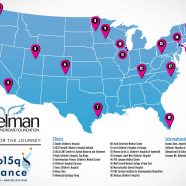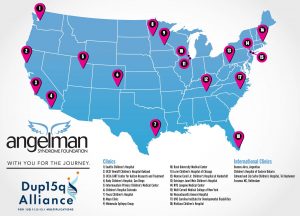
Announcing the 15q Clinical Research Network
Angelman Syndrome Foundation and Dup15q Alliance Announce Development of the International Clinical Research Network in efforts to help those living with 15q syndromes.
Thousands of families affected by Angelman syndrome (AS) and dup15q syndrome will soon have greater access to comprehensive clinical care through the development of The 15q Clinical Research Network. The Angelman Syndrome Foundation (ASF) and the Dup15q Alliance are proud to announce that through this collaborative effort the 15q Clinical Research Network would expand to 20 operating clinics to serve patients with Angelman syndrome or dup15q syndrome.
For more than a decade the ASF and Dup15q Alliance have been supporting multidisciplinary clinics to ensure up-to-date evidence-based clinical care for individuals with Angelman and Dup15q syndromes. What began as a few clinics has grown to almost 20 sites in the U.S. with four international sites between the two organizations. These clinics are working to standardize care for those with these disorders, a critical step forward as we approach clinical trials. Additionally, they serve as a platform for robust clinical research including collection of integral natural history data.
Angelman and dup15q syndromes are two rare conditions that occur due to a problem with the same region of the 15th chromosome. Because of that, they share symptoms (developmental delays, GI problems, seizures) that often require specialized care. Due to the rareness of the syndromes, local general practitioners and even specialized doctors often do not have a thorough knowledge of the complications and treatments. To get the care they need some families have traveled far to receive care for their loved ones at the clinics that have dotted the U.S. map.
Both foundations realized that there were far too many families who were not able to travel to receive specific care, so they embarked on a mission to dramatically expand the clinical reach of the networks and provide truly comprehensive care across the country by combining forces.
ASF CEO, Amanda Moore, says, “We believe that partnering with the Dup15q Alliance will allow us to increase our reach to the AS community and provide the best care for our families. Comprehensive and specific care is critical for AS families throughout the stages of their journey — by partnering with Dup15q Alliance we are able to reach thousands of more families with care and support by bringing AS Clinics to their geographical location.”
The joint expansion of the clinical network will also expand the amount of clinical trial sites in the future, increase research and publications, and add important clinical data that can impact the therapeutic treatments around both disorders.
Vanessa Vogel-Farley, Executive Director of Dup15q Alliance states, “One of the biggest challenges those who have 15q related disorders face is finding clinical support that is educated about their needs and that are effective activated partners in the complex medical care of their loved one. The collaboration between the Angelman and dup15q syndrome communities in the establishment of the 15q Clinical Research Network helps to alleviate that burden, by expanding the number of locations where expert providers are available, and establish a system for transferring care of the patients back to their local providers through education and seamless communication with providers.”
This is the not the first time that ASF and Dup15q Alliance have worked together. Because of the common issues with the 15th chromosome, the past several years ASF and Dup15q Alliance have co-hosted a research symposium every two years. Many researchers that study Angelman syndrome also study dup15q syndrome and the research symposium brings them together to share ideas and collaborate, advancing research and clinical trials.
Angelman syndrome is a rare genetic disorder caused by the loss of function of a specific gene (15q chromosome) during fetal development, resulting in severe neurological impairment present at birth and lasting for a lifetime. Symptoms vary and include severe developmental delays, speech impairments, seizures, walking and balance disorders, and frequent laughter and excitability. While there is no definitive count, it is estimated that Angelman syndrome occurs in one in every 15,000 live births.
Dup15q syndrome is a clinically identifiable syndrome that results from the duplication (or multiplication) of the same portion of the 15q chromosome that is deleted in Angelman Syndrome. Also known as chromosome 15q11.2-q13.1 duplication syndrome, this is a neurodevelopmental disorder that confers a strong risk for autism spectrum disorder, epilepsy, and intellectual disability, etc. It is estimated to occur in one out of every 8,000-10,000 live births.


